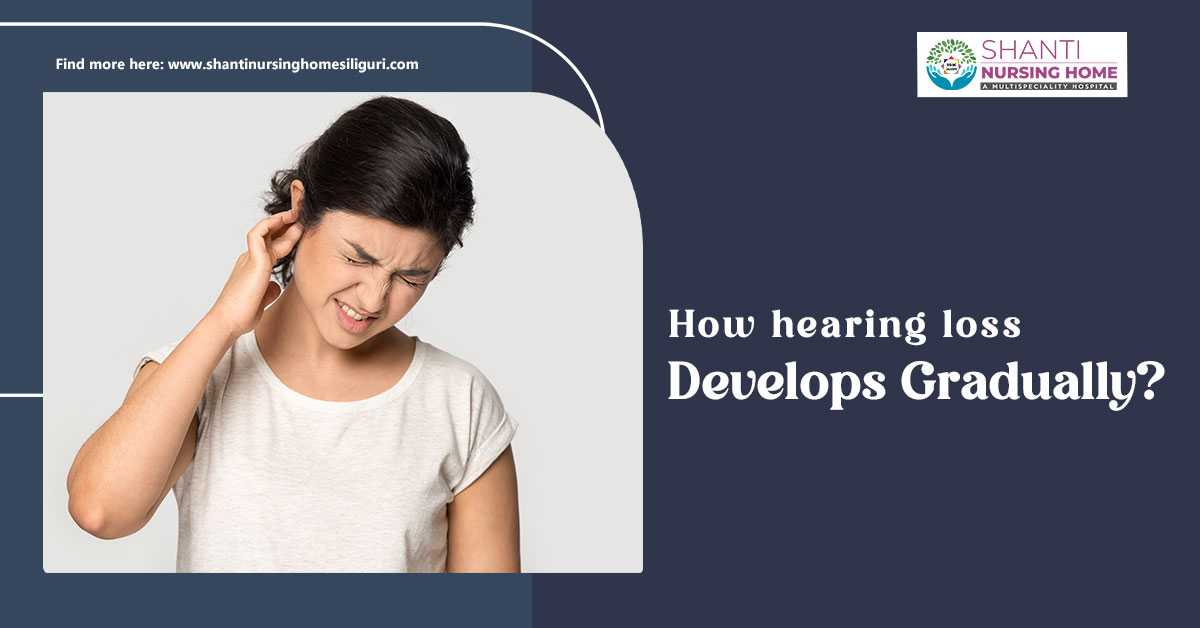Hearing is something we often take for granted, until we start noticing problems. Many people in Siliguri put off getting help because of myths and misunderstandings about hearing loss. Visiting the best nursing home in Siliguri can make it easier to get the right diagnosis and treatment from professionals who understand your needs.
Even small changes in your hearing, like asking people to repeat themselves or turning up the TV volume, can affect daily life. The earlier you get checked, the better the chances of preventing more serious problems later. Let’s take a closer look at eight common myths about hearing loss and what the truth really is.
Myth 1: Only Older Adults Experience Hearing Loss
Many people believe that hearing loss only affects older adults. While it’s true that aging can affect hearing, people of all ages can experience hearing problems. Children, teenagers, and adults may experience hearing loss due to genetic factors, exposure to loud noises, infections, or certain health conditions.
Ignoring small signs because you think you’re “too young for hearing loss” can make things worse over time. Noticing changes early, like having trouble following conversations or asking people to repeat themselves often, can help you get the right care before it becomes more serious.
Myth 2: Hearing Loss Is Always Obvious
Many people think they will notice hearing loss right away, but it usually happens slowly. You might find yourself lip-reading, asking people to repeat themselves, or turning up the TV or phone volume without even realizing it. Sometimes, you may feel tired or frustrated after conversations because your ears are working harder to understand.
Because the changes happen gradually, many wait too long to get help. Getting regular hearing check-ups, even if everything seems fine, can catch problems early and prevent them from getting worse. Early detection also makes treatments more effective and helps you stay confident in daily life.
Myth 3: Only People with Complete Deafness Need Treatment
Another myth is that treatment is only necessary for those who are completely deaf. In fact, even mild or moderate hearing loss can significantly affect daily life, including social interactions, work performance, and mental well-being.
Early intervention, whether through hearing aids, assistive devices, or therapy, can improve hearing and communication. Addressing hearing loss early can prevent frustration, social isolation, and even emotional stress.
Myth 4: Hearing Loss Is Just a Minor Inconvenience
Some people think hearing loss is just a minor problem that doesn’t need attention, but that’s not true. Even mild hearing difficulties can affect your relationships, work, and everyday life. Missing parts of conversations can cause misunderstandings, frustration, and sometimes make people avoid social situations.
Getting your hearing checked and treated early can prevent these problems and help you stay connected with family, friends, and work, keeping your life active and enjoyable.
Myth 5: Hearing Aids Are Uncomfortable and Ineffective
Hearing aids have come a long way in recent years. Modern devices are small, discreet, and comfortable. They are designed to fit your ear shape and amplify sounds according to your specific hearing needs.
Many people hesitate to use hearing aids due to outdated perceptions or fear of being judged. In reality, hearing aids can dramatically improve communication, confidence, and daily functioning when fitted and adjusted by a professional.
Myth 6: Loud Noises Are the Only Cause of Hearing Loss
Many people think loud noises are the only reason for hearing loss, but that’s not the whole story. Hearing problems can also be caused by genetics, aging, ear infections, injuries, chronic illnesses, or even certain medications. Understanding what’s causing your hearing loss is important because it helps your doctor recommend the right treatment.
Seeing a specialist can make a big difference, as they can identify the exact cause and suggest the best solutions. Early attention can prevent the problem from getting worse and help you maintain better hearing for longer.
Myth 7: Children Don’t Experience Hearing Loss
Many parents assume that hearing loss is only an adult issue, but children can have hearing difficulties, too. Untreated hearing loss in children can affect language development, learning, and social interactions.
Regular screenings, especially if there is a family history or if a child shows signs of difficulty hearing, are crucial. Early detection allows interventions such as hearing aids, therapy, or medical treatment, helping children reach their full potential.
Myth 8: Nothing Can Be Done About Hearing Loss
Some believe that once hearing loss occurs, nothing can be done. This is far from the truth. Today, audiology offers a wide range of solutions, including:
- Hearing aids that amplify and clarify sound
- Cochlear implants for severe hearing loss
- Medical treatments for ear infections or chronic conditions
- Auditory training and therapy to improve listening skills
With proper evaluation and guidance from a specialist, most people can regain much of their hearing ability and continue to enjoy daily activities without difficulty.
Recognizing Early Signs of Hearing Loss
Noticing hearing loss early can make a big difference in treatment and daily life. Some signs to watch for include:
- Trouble following conversations, especially in noisy places
- Frequently asking people to repeat themselves
- Turning up the volume on the TV, phone, or music higher than usual
- Ringing, buzzing, or other noises in the ears (tinnitus)
- Avoiding social situations because it’s hard to hear or follow conversations
Even small changes in hearing can affect work, school, and relationships over time. If you or a loved one notices any of these signs, it’s a good idea to get a professional hearing check-up as soon as possible. Early action can help prevent the problem from getting worse.
Why Acting Early Matters for Hearing Health
Taking action early when you notice hearing problems can make a big difference in your life. Getting help promptly can stop your hearing from getting worse, make conversations easier, and prevent feelings of frustration or isolation. Ignoring hearing loss can sometimes lead to social withdrawal, stress, or even depression over time.
Seeing an audiologist or hearing specialist ensures you get the right treatment based on your specific needs. They can guide you on using hearing aids, therapy, or other solutions, and provide tips on protecting your hearing in daily life. Early intervention also helps you stay confident, maintain relationships, and enjoy everyday activities without struggling to hear.
Conclusion
Hearing loss is more common than many realize, and myths often stop people from getting the help they need. Understanding the facts, noticing early signs, and consulting a professional can make a big difference in keeping your hearing healthy. Even small changes in your hearing, like difficulty following conversations or constantly asking people to repeat themselves, should not be ignored. Taking action early can prevent problems from getting worse and help you stay confident in your daily life. For guidance and proper evaluation, you can reach out to Shanti Nursing Home.
Comments (0)






